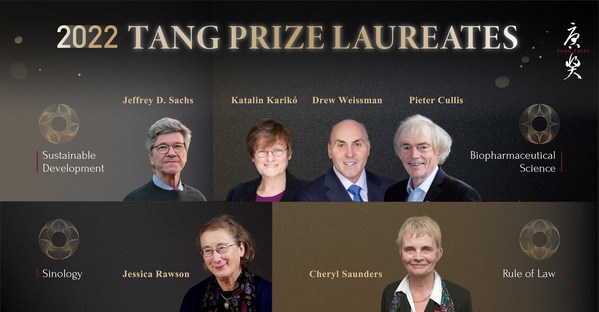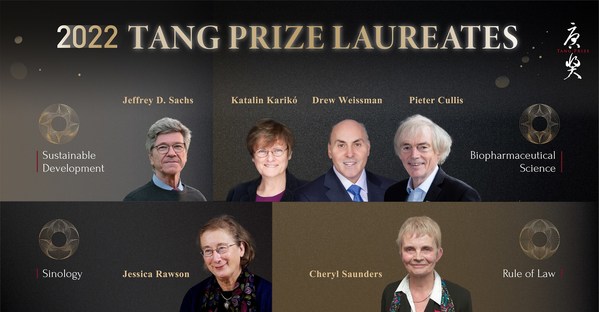TAIPEI, June 22, 2022 /PRNewswire/ — Since the outbreak of COVID-19, more than 530 million inflections have been reported globally. With the virus still raging in many countries, the world is suffering from supply chain disruptions and decade-high inflation, which has been exacerbated by the rising food and fuel prices due to regional conflicts. Political tensions in the international community also mean no one country can be immune to the adversities mentioned above. In addition, the European Union’s CBAM is scheduled to be implemented with a transitional period in 2023, and it is expected that the US, the UK, and Japan will follow suit soon. How would different governments react to the pressure of achieving net zero by 2050? Six laureates of the 2022 Tang Prize, newly introduced to the public in four press conferences taking place from June 18 to 21, have all shown selfless devotion to the advancement of human civilization and the improvement of the wellbeing of humanity. It is, thus, our sincere belief that their outstanding contributions to their individual disciplines and the insightful views they have expressed can bring stability and new opportunities to a world at a critical juncture at the moment.
In 2022, the Tang Prize in Sustainable Development was awarded to Jeffrey Sachs. A world renowned professor of economics who served as Special Advisor to three UN Secretaries-General, Professor Sachs is currently Director of the Center for Sustainable Development at Columbia University and President of the UN Sustainable Development Solutions Network (SDSN). He has made important contribution to the establishment and promotion of the UN Sustainable Development Goals (SDGs) and was recognized by the Selection Committee for "leading transdisciplinary sustainability science and creating the multilateral movement for its applications from village to nation and to the world."
The Prize in Biopharmaceutical Science went to three scientists who played a critical role in the development of SARS-CoV2 mRNA vaccines: Katalin Kariko, Drew Weissman, and Pieter Cullis, "for the discovery of key vaccinology concepts and approaches, leading to successful development mRNA-based COVID-19 vaccine," according to the Selection Committee’s citation. The breakthrough discoveries of these three laureates and the ingenious approaches they pioneered are the key to the rapid and successful development of vaccines against SARS-CoV-2. While Dr. Kariko and Dr. Weissman found a way to reduce the immunogenicity of mRNA, Prof. Cullis is credited with designing lipid nanoparticles for the delivery of mRNA vaccines.
The Prize in Sinology is awarded to Professor Dame Jessica Rawson, "for her gift and mastery of the craft of the visible to read the art and artifacts of Chinese civilization. By giving voice to the ancient world of objects, she has taught generations how to see when they look at things, and her acuity and vast visual learning have given new insight into the world of the lineages, transformations, and migrations of mute things."
Her contributions show that, besides the written word, there is another talent, another craft, which, by reading the art and artifacts of the world, allows us to interpret and understand distant and ancient societies, with their beliefs and interactions. Professor Rawson has taken this approach in her study of Chinese bronzes and jades, ancient Chinese tombs, and most especially in the exchanges between the peoples of the central China and their neighbors. In short, her original and trailblazing achievements in the archaeology of China and Inner Asia have revolutionized and broadened our understanding of early contact and exchange between the East and the West.
Professor Cheryl Saunders won the Prize in Rule of Law, for "her pioneering contributions to comparative constitutional law, and in particular her work on constitutions-building in the Asia-Pacific region." In the citation, the Selection Committee paid tribute to her working methods, noting that she applies "her scholarship to inspire and advise constitution-making exercises, often under challenging circumstances," and that she "consistently broadens the boundaries of comparative constitutional law scholarship through active engagement, dialogue and collaboration with scholars and political actors at home and abroad."
As the first woman to be appointed a law professor at the University of Melbourne, Professor Saunders has been made an officer of the Order Australia, awarded the Australian Centenary Medal, and Légion d’Honneur of France, and granted an honorary doctorate from the National University of Cordoba. Currently Laureate Professor Emeritus at the University of Melbourne, Professor Saunders is not only a pioneer in comparative constitutional studies but also an academic practitioner. She places special emphasis on an inclusive approach to comparative constitutional studies, advocating for incorporating constitutional experience from all over the world into our thinking, which broadens the vision of studies of comparative constitutional law beyond focusing on developments in Europe and North America.




